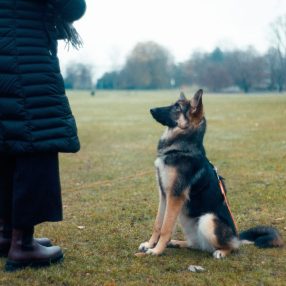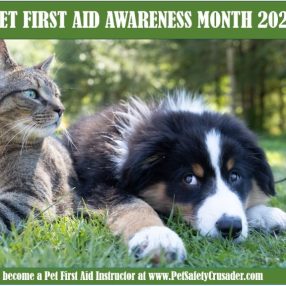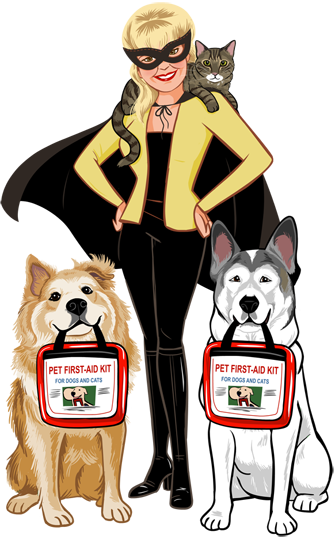
Zoonoses are infectious diseases that can be transmitted between animals and humans. Ebola, Zika & Hanta virus along with Swine & Bird flu may come to mind. HIV was a zoonotic disease transmitted to humans in the early 20th century but has now evolved into a separate human-only disease. In fact, 61% of the pathogens affecting humans are zoonotic! The increasing number and significance of zoonotic diseases emerging worldwide are due to multiple converging factors: climate change, increasing urbanization, human encroachment in wild areas, increased global travel and, for companion animals, increasing intimacy with humans (Yay! They ARE part of the family!) Zoonotic injuries include dog bites, cat scratches, tick and insect bites and stings, however…
Humans canNOT get Distemper from your canine pal any more than he can get Feline Rhinotracheitis from his kitty housemate. Knowing which diseases transfer between species and their signs and symptoms is vital if you share your life with animals, but also practice proper hygiene by thoroughly washing hands and wearing gloves when cleaning up after your best pal. The tiniest paper cut is bacteria’s highway into your bloodstream!
 ANYTIME you are bitten or scratched, wash the area for 10 minutes with Chlorhexidine, find out the animal’s vaccination info and have the wound looked at by a medical professional. Symptoms of Rabies range from fever and muscle aches, to nausea, agitation, hallucinations, aggressiveness and paralysis, while swollen lymph nodes are usually a sign of Cat Scratch Fever. Learning to properly handle pets and respond to their ever-changing body language may keep you safe.
ANYTIME you are bitten or scratched, wash the area for 10 minutes with Chlorhexidine, find out the animal’s vaccination info and have the wound looked at by a medical professional. Symptoms of Rabies range from fever and muscle aches, to nausea, agitation, hallucinations, aggressiveness and paralysis, while swollen lymph nodes are usually a sign of Cat Scratch Fever. Learning to properly handle pets and respond to their ever-changing body language may keep you safe.
Toxoplasmosis can cause blindness in an unborn human, so it is of concern to pregnant women as well as anyone with a compromised immune system. Most people possess the antibody, but a blood test can let you know for sure. Outdoor cats are the primary hosts shedding this parasitic disease via their feces. They may or may not demonstrate symptoms of lethargy, fever, weight loss, vomiting and/or diarrhea. In humans, enlarged lymph nodes, headache, fever (mononeucleosis-like symptoms) may indicate infection.
 Giardia & Coccidia are intestinal parasites. To prevent, provide pets with clean water and bowls and discourage them from eating feces. Also don’t let them drink from communal bowls at dog parks, and bring along fresh water so that they don’t lap out of lakes and streams. If in spite of your best attempts, massive quantities of vomit or diarrhea erupt, always wear rubber gloves when cleaning up and save those kisses for when your pooch is back in good health!
Giardia & Coccidia are intestinal parasites. To prevent, provide pets with clean water and bowls and discourage them from eating feces. Also don’t let them drink from communal bowls at dog parks, and bring along fresh water so that they don’t lap out of lakes and streams. If in spite of your best attempts, massive quantities of vomit or diarrhea erupt, always wear rubber gloves when cleaning up and save those kisses for when your pooch is back in good health!
Got Ringworm? Avoid direct contact with pets having a missing patch of hair or scabby circle. This fungus will leave ring-shaped bumpy spots on human skin requiring medical treatment.
Lyme Disease (measles-like eruptions accompanied by muscle aches, nausea and swollen lymph nodes) and Rocky Mountain Spotted Fever (‘target’-shaped rash bringing with it headache and nausea) are both tick-borne diseases. Keep pets free of parasites and check yourself after hikes. Although humans don’t get this one, watch cats for Cytauxzoonosis! It comes from the Lone Star and American Dog Tick. Also known as Bobcat Fever, it causes felines to go down fast and they can die within days of being bitten as the infection prevents blood from flowing to tissues resulting in multiple organ failure. Please be reminded that even indoor cats CAN get parasites!
Also keep dogs up-to-date on vaccinations and/or titer testing for Springtime-emerging Leptospirosis (wetter environments, near lakes and streams) which humans can get as well. Actually it is the the most widespread zoonotic disease in the world that has been found in almost all species of mammals!
Don’t downplay the importance of Heartworm testing BEFORE you see your first mosquito. Prevention costs less than one weekly bistro-made coffee, whereas treatment can be expensive and difficult. Initial symptoms are unseen, but cough followed by shortness of breath, abnormal lung sounds, fluid retention, loss of blood to the brain and death can occur if a heartworm positive dog goes untreated. Watch my VIDEO VLOG here to learn more: https://youtu.be/fRxUIoIAxgs
 Wear a dust mask when cleaning bird cages, and note green droppings and eye or nasal discharge. Psittacosis or Parrot Fever also infects budgies, gulls, cockatiels, sparrows and ducks. Humans end up coughing, vomiting and having pneumonia-like symptoms.
Wear a dust mask when cleaning bird cages, and note green droppings and eye or nasal discharge. Psittacosis or Parrot Fever also infects budgies, gulls, cockatiels, sparrows and ducks. Humans end up coughing, vomiting and having pneumonia-like symptoms.
In actuality, you are more likely to contract Salmonella from under-cooked food, but still, wash hands thoroughly after handling reptiles and amphibians. Abdominal cramping and diarrhea are effects of Salmonella which can be fatal! Remember though that any symptom can be associated with a number of diseases, so only your medical care professional knows for sure!
In spite of disease we may catch from our pets, pets ARE part of the family and they can improve our human family members’ health! The inverse of Zoonoses is Zooeyia (ZOO-ey-ah). The word comes from the Greek root word zoion (animal) and from the Greek Goddess of Health, Hygeia. If you share your life with a pet, this should come as no surprise, but there is now scientific proof that including pets in the family unit can actually improve wellness.
 Besides helping us develop stronger immune systems, lowering our stress and blood pressure…
Besides helping us develop stronger immune systems, lowering our stress and blood pressure…
- Pets get us moving. Humans of all ages with dogs in the family exercise more than those who do not share their life with a pet as the dog’s need for walks gets us up and moving too. When we don’t move, obesity and diabetes can reach epidemic portions in both children and adults. Physical activity also supports mental acuity. Studies show that humans who had walked over 72 blocks per week had a greater volume of grey matter 9 years later!
- Pets lower the impact of chronic disease. Studies have shown cats decrease the risk of cardiovascular disease in their owners and dogs provide comfort and support to cancer patients. Animals also help in the treatment of Post-Traumatic Stress Disorder, and dogs who suffer from PTSD as well may benefit from helping a human.
- Pets help kids. It has been shown that children who bond with a pet grow up to be more empathetic adults. They also often develop stronger immune systems and many develop a stronger sense of responsibility for caring for another species.
- Pets help us ‘kick the habit.’ Knowing secondhand smoke can harm our pets has motivated some smokers to quit! Inhaling secondhand smoke is a widely recognized risk factor for many diseases, including cancer as well as cardiovascular and respiratory diseases.
- Pets make us more social. Loneliness and isolation occur in our increasingly urbanized lifestyles, especially among the elderly. Having a pet gets people out meeting people (dogs can be ‘babe magnets’), taking part in activities with other pet parents, heading to parks, hiking and just staying in touch with the world. Caring for a pet gives many a reason to get up each morning!
A few vowels make a big difference between disease and good health when it comes to sharing life with our animal friends. Familiarize yourself with the signs of zoonotic diseases and embrace the good health and times that come to us via zooeyia!
Catch my Video VLOG on this topic: https://youtu.be/TSy7epI-qk4
__________________________________________________________
For 20 years Denise Fleck’s Sunny-dog Ink motto has been “Helping people to help their pets,” and she has…teaching more than 15,000 pet lovers animal life-saving skills and millions more on “The Doctors,” CNN, “Kirstie Alley’s Big Life,” Animal Planet and other TV shows. Denise is a frequent conference speaker, developed a line of pet first aid kits and now offers classes online.
Note: The articles on this page are copyrighted. Please do not reprint or use portions for any purpose without written permission from the author. Request permission for usage by sending an email explaining how you’d like to use the materials and what parts specifically. Thank you in advance!










